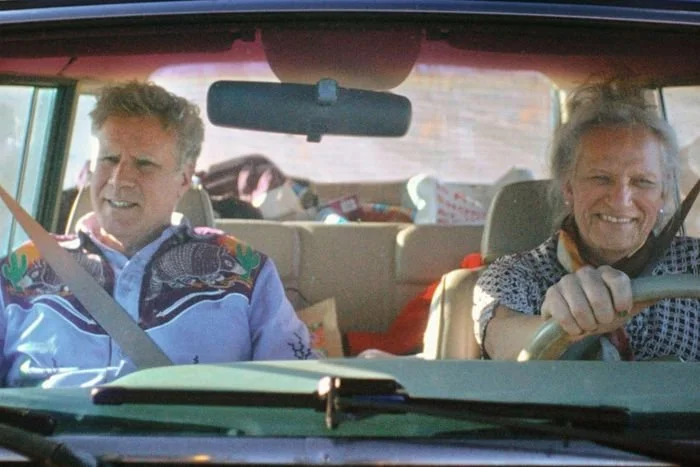WILL & HARPER
Directing: B
Writing: B
Cinematography: B
Editing: B+
A particularly fascinating way to experience the documentary feature Will & Harper is to watch it effectively as a double feature with Paris Is Burning, which was what I did. It was sort of by accident, a serendipitous result of scheduling and calendar availability. And while both films are absolutely worthy viewing, only one of them would I insist is essential: Paris Is Burning is widely (and rightly) considered to be one of the most seminal cinematic documents in both queer and cinema history, a tight 71 minutes of brilliant editing and even (particularly rare for documentary) some brilliant cinematography.
There’s no reason to be quite that effusive about Will & Harper, which exists less as an truly insightful documentary about the trans experience than it is an expansion on pretty well-worn insights—but still a solidly competent one.
Granted—and predictably—Will & Harper also offers some illustration as to how little progress has been made in the past 35 years, how the ability of a trans person to live their best life has perhaps gotten better only in some regions of America, and in other regions has stayed the same or even gotten worse. Rather than take a snapshot of one city subculture, Will & Harper jumps off from a vantage point that could not possibly me more mainstream (Will Ferrell) and paints a picture from coast to coast, as Farrell takes a cross-country road trip with his longtime close friend Harper, who only came out and transitioned a few years ago, in the middle of the pandemic.
Harper Steele had been a Staff Writer, and then Head Writer, at Saturday Night Live for many years. If you Google the film title Will & Harper today, Harper and Farrell’s names and photos come up at the top the results, as cast members. Steele’s photo is still from before transition. Someone at Google needs to get their shit together.
The fact that these are two older White people, and one of them not just a hugely popular older White man but a massive celebrity, really contributes to the specifics of content and vibe on this road trip, presented as a sort of experiment for these two longtime friends. Harper is fairly pointed about being open to people she considers friends asking “all the questions you’re not supposed to ask trans people.” Farrell’s presence is implicitly used as multiple layers of protection for Harper, who has a longtime love of cross-country travel to divey places she used to be partial to but is unsure she can still feel safe at (a hint of the White, male privilege she herself had at hand for protection in the past). Farrell offers security just as a “regular guy” friend she has along for the ride, and sometimes as a celebrity.
I can’t quite decide how I feel about the celebrity element here. There’s a kind of self-indulgence for a giant star like Will Farrell to be involved in a project like this, and it creates moments of at least mild discomfort onscreen. We see multiple places where Harper finds herself surprised by how kindly the locals treat her—as she is consistently very open about having recently transitioned—but it’s not always clear to the degree the local kindness is merely because Will Farrell is around.
To be fair, even though most of it seems to go fairly well, Will & Harper does not always depict this trip as a rosy experience. They make a stop at a huge restaurant in Amarillo, Texas, where the two of them order the huge steak they are supposed to try eating within an hour, surrounded by countless people filming them on their phones. Much of the film is shot with a camera mounted on the hood of their car, pointed at them through the windshield while they are driving, an it is here that we later see both Will and Harper acknowledge the Amarillo scene as a misstep. Sometimes, not even giant celebrity can shield Harper from concentrated hate, and this is the only time in the film when we see a montage of hateful tweet. “Fuck liberal Will Farrell” is among the least hateful.
This isn’t quite the point of Will & Harper, though, but rather an acknowledgment of the world Harper—and all trans people—are having to navigate. It’s clearly insightful to Will Farrell, who has never had a trans person this close to him come out before. Presumably the film will thus be insightful in similar ways to plenty of viewers as well, and here is where his celebrity is actually likely to do some good: probably not as many people would watch the film if Harper were traveling across the country with some other person Americans don’t already know.
At its heart, though, Will & Harper is just about the two of them, reconnecting, navigating the uncharted waters of a recently transitioned, longtime friend who is now in her early sixties. Farrell is learning how to reconcile who he had thought was one of his close guy friends, but had actually been a woman friend all along. And Farrell should be given a lot of credit here, for not just his open mindedness but his open heartedness, as clearly he worries less about how this will affect their friendship than about a dear friend being happy. And that is certainly what we can stand to see more of onscreen.
More ups than downs, like any ride should have.
Overall: B

